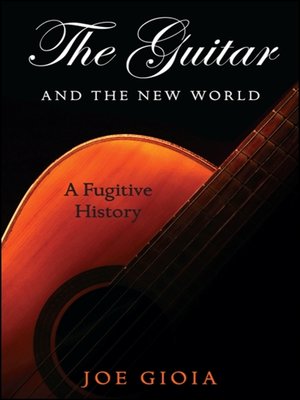The Guitar and the New World
ebook ∣ A Fugitive History · SUNY series in Italian/American Culture
By Joe Gioia

Sign up to save your library
With an OverDrive account, you can save your favorite libraries for at-a-glance information about availability. Find out more about OverDrive accounts.
Find this title in Libby, the library reading app by OverDrive.



Search for a digital library with this title
Title found at these libraries:
| Loading... |
The American guitar, that lightweight wooden box with a long neck, hourglass figure, and six metal strings, has evolved over five hundred years of social turmoil to become a nearly magical object—the most popular musical instrument in the world. In The Guitar and the New World, Joe Gioia offers a many-limbed social history that is as entertaining as it is informative. After uncovering the immigrant experience of his guitar-making Sicilian great uncle, Gioia's investigation stretches from the ancient world to the fateful events of the 1901 Buffalo Pan American Exposition, across Sioux Ghost Dancers and circus Indians, to the lives and works of such celebrated American musicians as Jimmy Rodgers, Charlie Patton, Eddie Lang, and the Carter Family.
At the heart of the book's portrait of wanderings and legacies is the proposition that America's idiomatic harmonic forms—mountain music and the blues—share a single root, and that the source of the sad and lonesome sounds central to both is neither Celtic nor African, but truly indigenous—Native American. The case is presented through a wide examination of cultural histories, academic works, and government documents, as well as a close appreciation of recordings made by key rural musicians, black and white, in the 1920s and '30s.
The guitar in its many forms has cheered humanity through centuries of upheaval, and The Guitar and the New World offers a new account of this old friend, as well as a transformative look at a hidden chapter of American history.
At the heart of the book's portrait of wanderings and legacies is the proposition that America's idiomatic harmonic forms—mountain music and the blues—share a single root, and that the source of the sad and lonesome sounds central to both is neither Celtic nor African, but truly indigenous—Native American. The case is presented through a wide examination of cultural histories, academic works, and government documents, as well as a close appreciation of recordings made by key rural musicians, black and white, in the 1920s and '30s.
The guitar in its many forms has cheered humanity through centuries of upheaval, and The Guitar and the New World offers a new account of this old friend, as well as a transformative look at a hidden chapter of American history.






